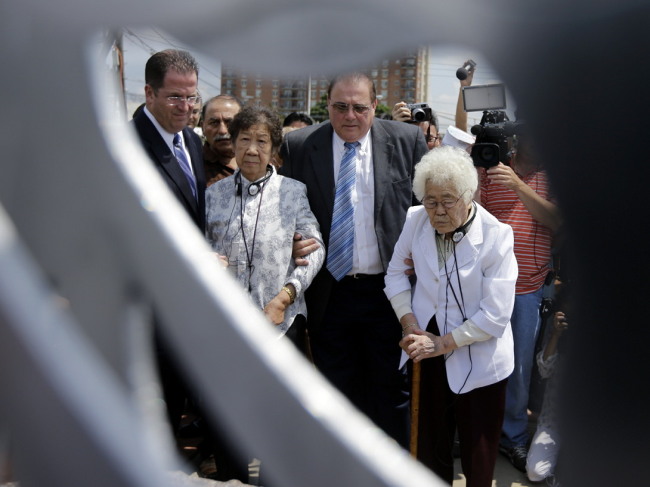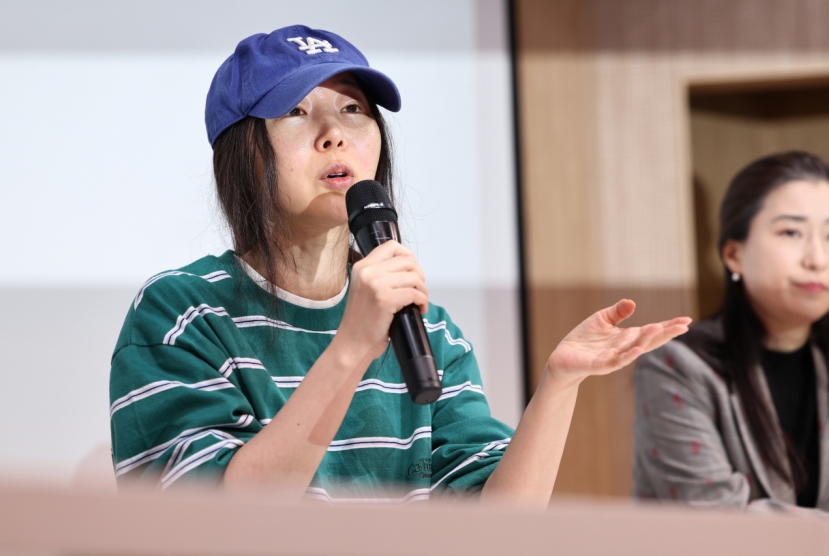Japan is coming under increasing pressure to atone for its wartime sexual enslavement of Korean and other Asian women.
U.N. high commissioner for human rights Navi Pillay issued a statement Thursday to express “profound regret” over Tokyo’s failure to pursue a “comprehensive, impartial and lasting resolution” of the issue, saying the human rights of the so-called former comfort women “continue to be violated decades after the end of World War II.”
The women face “increasing denials and degrading remarks” by Tokyo officials she said, citing a recent review of Japan’s breakthrough 1993 apology for its operation of frontline brothels, which concluded that it was not possible to confirm that the women were forcefully recruited.
“It pains me to see that these courageous women, who have been fighting for their rights, are passing away one by one, without their rights restored and without receiving the reparation to which they are entitled,” the outgoing commissioner said.
“This is not an issue relegated to history. It is a current issue, as human rights violations against these women continue to occur as long as their rights to justice and reparation are not realized.”
Pillay’s remarks came as the U.N. and other countries relay pressure on the Shinzo Abe government to resolve the festering issue and criticism over its ongoing attempt to whitewash its imperial past and undercut past apologies.
Last month, the U.N. Human Rights Committee urged “immediate and effective legislative and administrative measures” to ensure that all allegations are probed and perpetrators prosecuted.
The panel, comprised of 18 independent experts from around the world, also called for access to justice and reparations for victims and their families, the disclosure of all evidence available, and education in Japan on the issue.
U.N. high commissioner for human rights Navi Pillay issued a statement Thursday to express “profound regret” over Tokyo’s failure to pursue a “comprehensive, impartial and lasting resolution” of the issue, saying the human rights of the so-called former comfort women “continue to be violated decades after the end of World War II.”
The women face “increasing denials and degrading remarks” by Tokyo officials she said, citing a recent review of Japan’s breakthrough 1993 apology for its operation of frontline brothels, which concluded that it was not possible to confirm that the women were forcefully recruited.
“It pains me to see that these courageous women, who have been fighting for their rights, are passing away one by one, without their rights restored and without receiving the reparation to which they are entitled,” the outgoing commissioner said.
“This is not an issue relegated to history. It is a current issue, as human rights violations against these women continue to occur as long as their rights to justice and reparation are not realized.”
Pillay’s remarks came as the U.N. and other countries relay pressure on the Shinzo Abe government to resolve the festering issue and criticism over its ongoing attempt to whitewash its imperial past and undercut past apologies.
Last month, the U.N. Human Rights Committee urged “immediate and effective legislative and administrative measures” to ensure that all allegations are probed and perpetrators prosecuted.
The panel, comprised of 18 independent experts from around the world, also called for access to justice and reparations for victims and their families, the disclosure of all evidence available, and education in Japan on the issue.

With the sex slavery issue being the biggest thorn between the two core regional allies officials at the White House and the U.S. State Department held a meeting with two visiting former comfort women on July 31.
Tokyo, however, argues that the victims cannot be categorized as slaves and that the feud was settled by a 1965 agreement that normalized its relations with Seoul.
At a news conference in Seoul in April, U.S. President Barack Obama called the mobilization of sex slaves a “terrible, egregious and shocking” breach of human rights.
“It is deplorable and clearly a grave human rights violation of enormous proportions that the Japanese military was involved in the trafficking of women for sexual purposes in the 1930s and 1940s,” U.S. State Department spokesperson Jen Psaki said. “We encourage Japan to continue to address this issue in a manner that promotes healing and facilitates better relations with neighboring states.”
As Korea and Japan hold monthly director-general-level talks on the issue, Seoul officials expect the growing international calls to sway public sentiment in Japan and eventually the government’s attitude.
“The ongoing series of moves around the world would inevitably put Tokyo in an awkward position,” a senior official at Seoul’s Foreign Ministry said on customary condition of anonymity.
“The Pillay statement, for instance, is sort of an expression of the U.N.’s discontent with Japan’s lack of efforts to fundamentally resolve the issue despite its repeated demands.”
The number of victims of sex slavery could be as high as 200,000, mostly Korean, historical records show. Currently, 54 out of 237 registered victims are alive, with their average age at 88.
By Shin Hyon-hee (heeshin@heraldcorp.com)



![[Herald Interview] 'Amid aging population, Korea to invite more young professionals from overseas'](http://res.heraldm.com/phpwas/restmb_idxmake.php?idx=644&simg=/content/image/2024/04/24/20240424050844_0.jpg&u=20240424200058)















